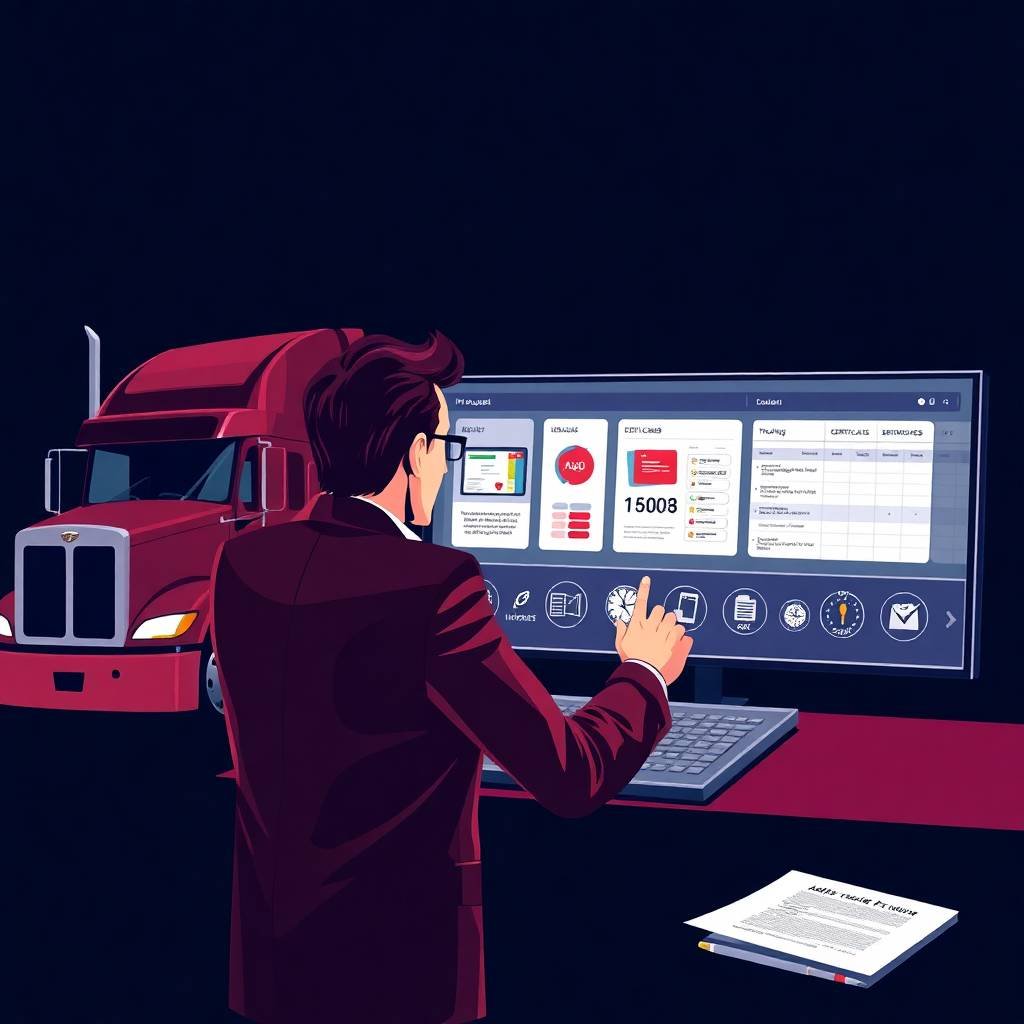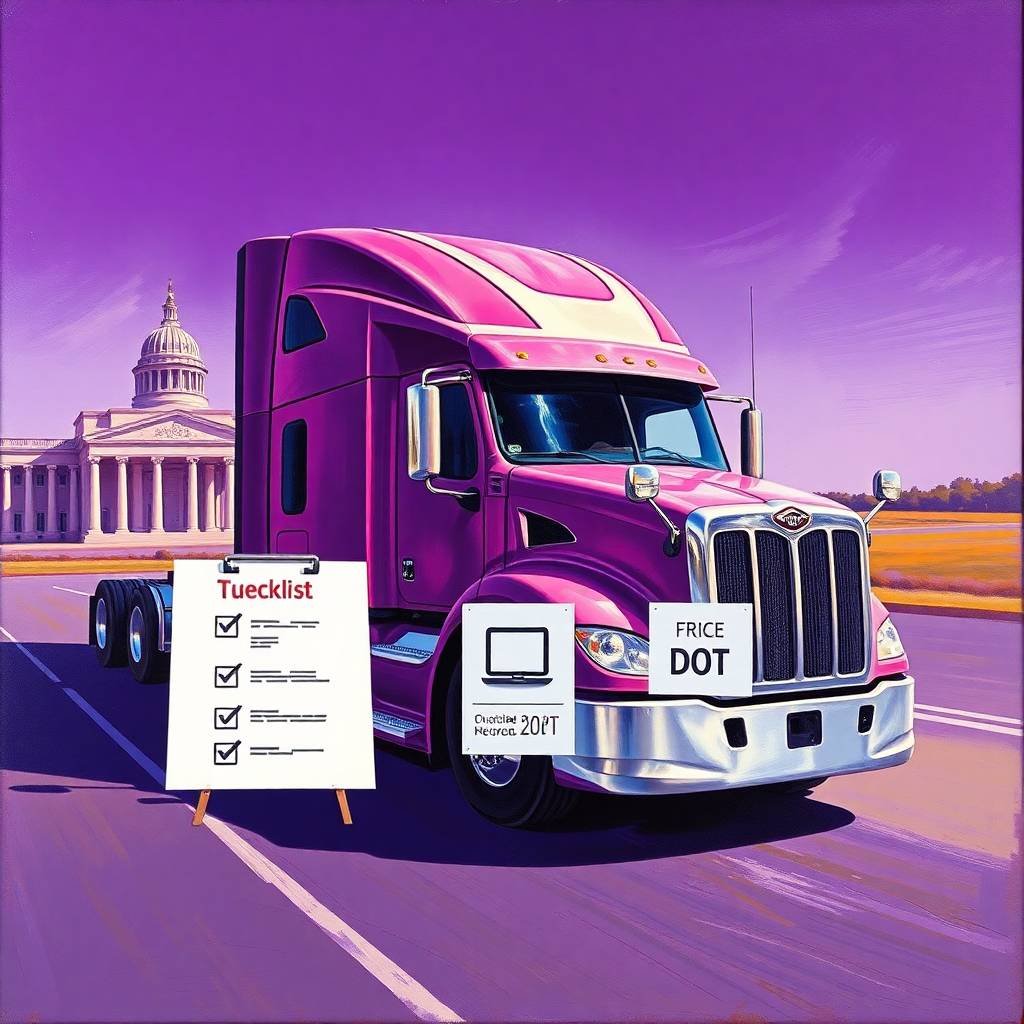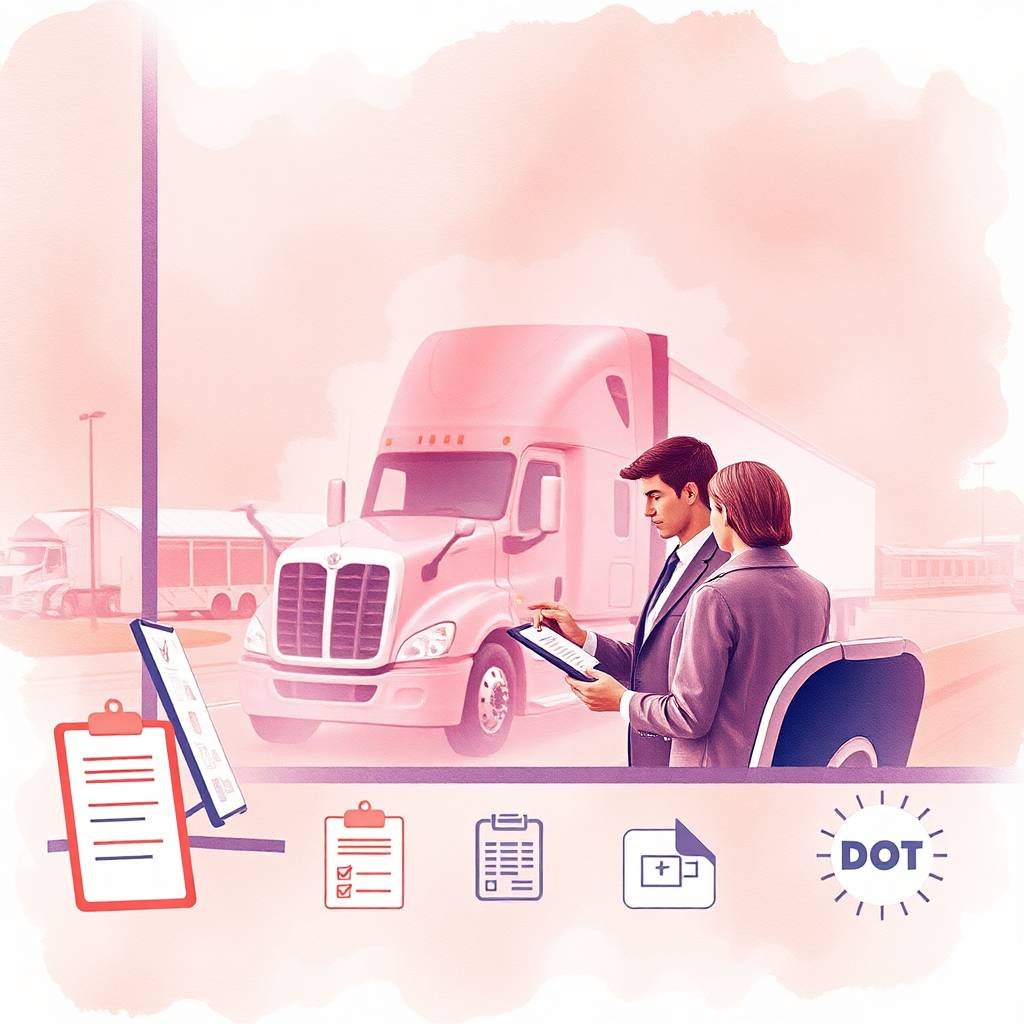1. Understanding FMCSA Compliance Requirements for Trucking Companies: A Foundational Overview
Navigating the FMCSA Compliance Requirements for Trucking Companies is essential for maintaining lawful operations, avoiding fines, and building a reliable transportation business. The Federal Motor Carrier Safety Administration (FMCSA), under the U.S. Department of Transportation (DOT), sets and enforces safety standards for commercial motor vehicle operations in the United States. Staying compliant means understanding every detail — from driver qualification to audit readiness.
What Are FMCSA Compliance Requirements?
FMCSA Compliance Requirements for Trucking Companies encompass a wide range of operational rules designed to enhance highway safety. These include proper drug and alcohol testing, maintaining driver qualification (DQ) files, implementing a DOT compliance checklist, and adhering to the FMCSA Safety Measurement System (SMS) 2025 protocols. Non-compliance can result in penalties, fines, or even revoked operating authority.
Companies can review official regulations directly on FMCSA’s website or consult the Department of Transportation through Transportation.gov. The White House also plays a role in influencing transportation policy updates that may impact compliance requirements.
Common Violations and How to Avoid Them
Key violations include poor DQ file management, skipped drug and alcohol tests, or incomplete maintenance records. For a detailed analysis, read our guide on FMCSA compliance mistakes. Avoid these by using our DQ file setup and monitoring services and staying updated through our blog.
Essential Compliance Areas
- DQ Files: See driver qualification file requirements.
- Audit Readiness: Review our DOT audit preparation service and helpful post on DOT audit preparation 2025.
- Substance Testing: Understand the rules on drug and alcohol testing compliance and consider our management services.
- Clearinghouse Registration: Follow FMCSA Clearinghouse rules here.
- DOT Checklist: Our DOT compliance checklist ensures your business checks all regulatory boxes.
Helpful Services and Tools for Carriers
FMCSA Compliance Requirements for Trucking Companies are manageable with the right tools. We provide full support through services like UCR filing assistance, IFTA/IRP/BOC-3 support, and ongoing consulting for both small fleets and owner-operators.
Owner-operators can explore dedicated solutions:
For tailored guidance, schedule your appointment today.
Stay Informed and Compliant
Read our latest insights and previous posts to keep up with industry changes. For ongoing help with FMCSA Compliance Requirements for Trucking Companies, visit our compliance help center.
Before engaging with our content or services, we recommend reviewing our Disclaimer, Privacy Policy, and Terms of Service.

2. Pre-Employment Drug Testing: A Critical First Step Toward Safety Compliance
In the highly regulated world of commercial trucking, ensuring road safety starts before a driver even gets behind the wheel. Pre-employment drug testing is not just a best practice—it is a core requirement under FMCSA Compliance Requirements for Trucking Companies. This process is critical to ensuring that only qualified, drug-free individuals operate commercial motor vehicles, thus protecting public safety and your company’s reputation.
Why Pre-Employment Testing Matters
The Federal Motor Carrier Safety Administration (FMCSA), under the U.S. Department of Transportation, mandates that all motor carriers conduct pre-employment drug testing for drivers who require a commercial driver’s license (CDL). The policy is part of broader FMCSA Compliance Requirements for Trucking Companies aimed at preventing accidents and improving safety outcomes. To see official updates, visit the FMCSA’s website or stay informed through policy initiatives outlined by the White House.
This testing is essential not only for compliance but also for risk mitigation. A driver under the influence poses a liability risk and undermines your safety rating. Learn more about maintaining your safety score in our guide on the FMCSA Safety Measurement System (SMS) 2025.
Integrating Testing Into a Full Compliance Strategy
Pre-employment drug screening should be integrated into your larger compliance framework. It’s directly connected to several areas governed by FMCSA Compliance Requirements for Trucking Companies, including:
Failing to conduct or properly document testing can lead to DQ file violations, resulting in hefty fines. Use our drug and alcohol testing management service to stay compliant with drug and alcohol testing compliance rules.
Avoiding Common Mistakes
Many carriers unknowingly fall out of compliance due to simple oversights. Review our post on FMCSA compliance mistakes and ensure your pre-employment processes are airtight. Combine testing protocols with DOT audit preparation to ensure you’re ready when auditors arrive. For tips on audit success, read our insights on DOT audit preparation 2025.
Resources for Ongoing Compliance
Whether you’re a fleet owner or independent operator, understanding and executing FMCSA Compliance Requirements for Trucking Companies is ongoing. We provide comprehensive solutions including UCR filing assistance and IFTA/IRP/BOC-3 support.
Visit Truckers Compliance Hub to view our latest resources and compliance posts. If you need help navigating complex FMCSA rules, schedule your appointment today.
Explore targeted support:
General FMCSA compliance help for trucking companies
FMCSA compliance services for owner-operators

3. Building a Bulletproof Driver Qualification File (DQF)
For motor carriers, building and maintaining a complete Driver Qualification File (DQF) is a foundational requirement under FMCSA Compliance Requirements for Trucking Companies. A DQF is more than just paperwork—it’s a legal necessity that reflects your company’s commitment to safety, accountability, and full regulatory compliance.
What Is a Driver Qualification File?
A DQF is a collection of records that proves a driver is legally qualified to operate a commercial motor vehicle. Per the Federal Motor Carrier Safety Administration (FMCSA), every motor carrier must maintain an up-to-date file for each CDL driver they employ. These requirements fall directly under the umbrella of FMCSA Compliance Requirements for Trucking Companies and are strictly enforced by regulators from the U.S. Department of Transportation.
To understand exactly what documents are required, check our detailed breakdown on Driver Qualification File Requirements.
Why It Matters for FMCSA Compliance
Creating a bulletproof DQF ensures your company meets all FMCSA Compliance Requirements for Trucking Companies. Failure to comply may result in DQ file violations, costly fines, or a failed audit. Many violations are preventable if companies avoid common FMCSA compliance mistakes.
The DQF is also a key component of your DOT compliance checklist and essential during DOT audit preparation.
What Goes in a Bulletproof DQF?
Your DQF should include:
- Employment application
- Previous employer verification
- Motor vehicle records (MVRs)
- Road test certificate or equivalent
- Medical examiner’s certificate
- Annual review of driving record
- Certificate of violations
To streamline this process and ensure full adherence to FMCSA Compliance Requirements for Trucking Companies, consider our DQ File Setup and Monitoring Service.
Ongoing Compliance and Updates
Maintaining DQFs is not a one-time task. Files must be reviewed and updated regularly to ensure ongoing compliance. For support, view our FMCSA Safety Measurement System (SMS) 2025 guide to learn how DQFs impact your safety score.
Additionally, drug and alcohol testing records—another crucial piece of FMCSA Compliance Requirements for Trucking Companies—must be included. Learn more about drug and alcohol testing compliance and let us assist with drug and alcohol testing management.
Stay Compliant, Stay Protected
Keeping your DQFs airtight can protect your company during audits and inspections. For full audit prep, use our DOT Audit Preparation Services, and if you need a deeper understanding of clearinghouse rules, read our guide on FMCSA Clearinghouse Compliance.
Explore more valuable compliance insights at Truckers Compliance Hub and browse our services for:
Need help right away? Schedule your appointment now for expert guidance on DQFs and other FMCSA Compliance Requirements for Trucking Companies.
Additional Resources
For more insights, visit:
- FMCSA Compliance Help for Trucking Companies
- FMCSA Compliance Services for Owner-Operators
- Owner-Operator Services – Expanded
Before using our site or services, please review our Disclaimer, Privacy Policy, and Terms of Service.

4. Staying Ahead with Regular Vehicle Inspections and Maintenance
Regular vehicle inspections and maintenance are not just best practices—they are non-negotiable under FMCSA Compliance Requirements for Trucking Companies. From ensuring driver safety to avoiding costly violations, proactive maintenance routines play a central role in meeting the standards established by the Federal Motor Carrier Safety Administration (FMCSA), the U.S. Department of Transportation, and broader government mandates enforced by agencies like the White House.
The Role of Inspections in FMCSA Compliance
Daily vehicle inspections, annual inspections, and maintenance logs are all part of critical documentation required under FMCSA Compliance Requirements for Trucking Companies. Failure to maintain these records can result in severe penalties and jeopardize your company’s standing during DOT audit preparation. That’s why we encourage carriers to integrate maintenance into their DOT compliance checklist to ensure no detail is overlooked.
Vehicle Health Directly Affects Safety Scores
Poor maintenance impacts more than the vehicle—it affects your FMCSA Safety Measurement System (SMS) 2025 scores, which in turn influence your inspection priority and insurance rates. Trucks taken out of service due to mechanical failures reflect negatively on your safety profile and violate FMCSA Compliance Requirements for Trucking Companies.
Many carriers unknowingly make FMCSA compliance mistakes by skipping required inspections or neglecting documentation. To avoid these costly errors, access step-by-step guidance on TruckersComplianceHub.com.
Integrating Inspections into Your Compliance Program
Vehicle inspection reports must be included in your broader compliance strategy, alongside key components like Driver Qualification File (DQF) requirements and drug and alcohol testing compliance. These areas work in tandem to fulfill comprehensive FMCSA Compliance Requirements for Trucking Companies.
For help setting up DQFs, explore our DQ File Setup and Monitoring service. We also offer expert Drug and Alcohol Testing Management and UCR Filing Assistance to help keep your fleet fully compliant.
Partner With Compliance Experts
Staying proactive about inspections helps prevent DQ file violations and prepares you for a seamless audit. With support from our seasoned compliance team, you can reduce risk and boost operational efficiency. Need personalized support? Schedule your appointment here to speak with our compliance specialists.
For additional support, our services include:
And for more guidance tailored to your fleet, see:
- FMCSA Compliance Help for Trucking Companies
- FMCSA Compliance Services for Owner-Operators
- Expanded Owner-Operator Support
Stay Informed, Stay Compliant
Whether you’re concerned about FMCSA Clearinghouse Compliance or fleet inspections, compliance is ongoing. Regular maintenance is just one part of the bigger picture—but it’s one that keeps your drivers safe and your company legally secure.
Visit Truckers Compliance Hub for the latest updates, or review our Disclaimer, Privacy Policy, and Terms of Service to understand your rights and responsibilities.

5. How to Navigate Hours-of-Service (HOS) Rules Without Risk
Understanding and following Hours-of-Service (HOS) regulations is essential for meeting FMCSA Compliance Requirements for Trucking Companies. These federal rules—enforced by the Federal Motor Carrier Safety Administration—are designed to reduce driver fatigue and improve safety. However, non-compliance can lead to serious penalties, including out-of-service orders, fines, and poor CSA scores.
At Truckers Compliance Hub, we help carriers interpret HOS rules and integrate them into their daily operations for full compliance.
Why HOS Compliance Is Critical
HOS rules form the foundation of FMCSA Compliance Requirements for Trucking Companies. These regulations dictate how many hours a driver can operate, how long they must rest, and when breaks are required. Violating these limits not only impacts safety—it can also increase your company’s exposure during a DOT audit.
The DOT compliance checklist should include routine monitoring of logbooks and ELD (Electronic Logging Device) data to ensure that drivers do not exceed their operational limits.
Common HOS Mistakes Carriers Make
Many trucking companies make FMCSA compliance mistakes by failing to monitor HOS data effectively or by misclassifying rest periods. These oversights can quickly lead to DQ file violations and safety score reductions under the FMCSA Safety Measurement System (SMS) 2025.
Another common issue is the lack of proper Driver Qualification File (DQF) management. Without complete and up-to-date records, even a single HOS violation can snowball into broader non-compliance with FMCSA Compliance Requirements for Trucking Companies.
Tools and Services to Stay Compliant
If you’re unsure how to stay on top of HOS and other critical requirements, we offer support services such as:
- DQ File Setup and Monitoring
- DOT Audit Preparation
- Drug and Alcohol Testing Management
- IFTA, IRP, and BOC-3 Support
- UCR Filing Assistance
We also provide detailed insights into Drug and Alcohol Testing Compliance and FMCSA Clearinghouse Compliance, both of which are tied closely to maintaining HOS integrity.
Don’t Go It Alone—Get Professional Guidance
Navigating FMCSA Compliance Requirements for Trucking Companies doesn’t have to be a solo effort. You can schedule your appointment here to get personalized help.
We offer specialized services for all types of carriers. Check out:
- FMCSA Compliance Help for Trucking Companies
- FMCSA Compliance Services for Owner-Operators
- FMCSA Compliance Services for Owner-Operators – Expanded
Stay Informed and Protected
HOS rules may evolve over time based on updates from the U.S. Department of Transportation and White House policies. Staying up-to-date is essential to fully comply with FMCSA Compliance Requirements for Trucking Companies.
Be sure to review our Disclaimer, Privacy Policy, and Terms of Service to understand your rights and responsibilities when working with us.
For ongoing updates, visit the Truckers Compliance Hub blog where we publish valuable resources for compliance success.

6. Mastering the Use of the FMCSA Drug and Alcohol Clearinghouse
Navigating the FMCSA Compliance Requirements for Trucking Companies can be complex, especially when it comes to drug and alcohol testing. One of the most vital tools in this area is the FMCSA Drug and Alcohol Clearinghouse—a secure online database that provides real-time access to information about CDL driver drug and alcohol program violations.
Understanding how to use this system correctly is not optional. It’s a federal mandate that directly affects your ability to operate legally and safely under the Federal Motor Carrier Safety Administration guidelines.
Why the Clearinghouse Is Essential for Compliance
The Clearinghouse plays a central role in upholding FMCSA Compliance Requirements for Trucking Companies. It tracks violations, return-to-duty processes, and follow-up testing plans. Employers must conduct mandatory pre-employment queries and annual checks to ensure drivers are eligible to operate.
Our FMCSA Clearinghouse Compliance guide explains how to navigate the system effectively and avoid costly penalties. Compliance mistakes here can lead to DQ file violations and impact your scores in the FMCSA Safety Measurement System (SMS) 2025.
Meeting Drug and Alcohol Testing Obligations
Regular and random testing, along with proper reporting in the Clearinghouse, are critical components of FMCSA Compliance Requirements for Trucking Companies. Our Drug and Alcohol Testing Compliance guide breaks down the requirements for both owner-operators and fleet managers.
To help stay ahead, we offer Drug and Alcohol Testing Management services, giving you peace of mind that your program is aligned with federal expectations.
Tools and Resources for Better Compliance
Many fleets fall short on compliance due to poor record-keeping. A missed query or an undocumented test can trigger issues during a DOT audit. Our DQ File Setup and Monitoring and DOT Audit Preparation services help carriers meet all FMCSA Compliance Requirements for Trucking Companies.
For a broader compliance strategy, review our DOT compliance checklist and avoid common FMCSA compliance mistakes. These tools help ensure your Driver Qualification Files are always up to date.
Need help right away? Schedule your appointment here to speak with a compliance expert.
Stay Informed and Compliant
The Clearinghouse continues to evolve with federal policy changes from agencies like the U.S. Department of Transportation and White House. Staying current with FMCSA Compliance Requirements for Trucking Companies is essential. You can keep up with industry trends by visiting our blog at Truckers Compliance Hub.
We also offer support for:
Explore more tailored help here:
- Compliance Help for Trucking Companies
- Services for Owner-Operators
- Expanded Owner-Operator Services
Before engaging, be sure to review our Disclaimer, Privacy Policy, and Terms of Service.

7. Top Recordkeeping Practices That Ensure FMCSA Audit Success
In the trucking industry, maintaining accurate and accessible records is not just good practice—it’s a legal requirement. To pass a DOT audit with confidence, trucking companies must adopt effective recordkeeping strategies that align with all FMCSA Compliance Requirements for Trucking Companies.
Failing to comply can result in hefty fines, operational downtime, and damage to your company’s safety rating. Below, we outline essential recordkeeping practices to ensure you’re always audit-ready.
Understand FMCSA’s Documentation Standards
The Federal Motor Carrier Safety Administration (FMCSA) mandates that all motor carriers maintain specific records for defined periods. From Driver Qualification (DQ) files to drug and alcohol test results, every document must be accurate, updated, and accessible.
Our DOT Compliance Checklist is a valuable tool that outlines exactly what’s required under FMCSA Compliance Requirements for Trucking Companies. We also break down typical FMCSA compliance mistakes that companies should avoid during audits.
Maintain Accurate Driver Qualification Files
DQ files are a cornerstone of compliance. Each driver’s file must include employment history, medical certifications, MVRs, and safety performance history. Read our full DQ file requirements guide to ensure nothing is overlooked.
Improper or missing DQ documentation is a leading cause of FMCSA violations. We offer DQ File Setup and Monitoring services to help keep your records up to date.
Stay Compliant with Drug & Alcohol Testing Records
Testing logs must be retained for various durations depending on the type of test. Our Drug and Alcohol Testing Compliance guide and Drug and Alcohol Testing Management services ensure that all your testing documentation meets federal standards.
Don’t forget to stay current with the FMCSA Drug and Alcohol Clearinghouse for tracking violations and return-to-duty processes.
Prepare for Audits Proactively
Audit preparation should be ongoing—not a last-minute scramble. Our FMCSA Audit Preparation Services are designed to review your entire compliance program before federal or state inspections.
You can also track your safety performance using the FMCSA Safety Measurement System (SMS) 2025, a key part of meeting FMCSA Compliance Requirements for Trucking Companies.
Keep Administrative Records Current
UCR registration, IFTA, IRP, and BOC-3 filings are also vital for audit readiness. We offer support for UCR Filing Assistance and IFTA/IRP/BOC-3 compliance to make recordkeeping easier.
For broader assistance, check out our FMCSA Compliance Help for Trucking Companies, or tailored Owner-Operator services and expanded packages.
Schedule a Consultation
Need help getting your records in order? Schedule your appointment today to speak with a compliance expert. You can also explore more insights and stay informed with updates from the U.S. Department of Transportation and White House transportation policy.
For legal clarity, please review our Disclaimer, Privacy Policy, and Terms of Service.

8. The Role of Training Programs in FMCSA Compliance Requirements for Trucking Companies
In the highly regulated trucking industry, proper training is not just a best practice—it’s a foundational element of meeting FMCSA Compliance Requirements for Trucking Companies. As regulations continue to evolve, training programs play a vital role in ensuring that drivers, safety managers, and company owners stay compliant, avoid penalties, and maintain operational efficiency.
Why Training Matters for FMCSA Compliance
The Federal Motor Carrier Safety Administration (FMCSA) enforces strict rules around driver conduct, recordkeeping, and operational procedures. Failure to follow these regulations can result in fines, disqualifications, and intervention from federal authorities. Well-structured training programs ensure every stakeholder understands their responsibilities and how to fulfill them.
Whether you’re a new carrier or a seasoned operation, compliance begins with education. Our FMCSA Compliance Checklist outlines the key areas where training can prevent costly mistakes.
Core Training Topics for Compliance
To effectively meet FMCSA Compliance Requirements for Trucking Companies, training should cover:
- Driver Qualification File Requirements
Learn what documentation is needed and how to maintain accurate DQ files to avoid violations. You can also streamline your recordkeeping with our DQ File Setup and Monitoring services. - Drug and Alcohol Testing Compliance
Understanding the Drug and Alcohol Testing Requirements and how to use the FMCSA Clearinghouse is crucial for any fleet. Consider our Drug and Alcohol Testing Management program for hassle-free compliance. - Safety and Performance Monitoring
Proper training on interpreting the FMCSA Safety Measurement System (SMS) data helps identify risk trends before they become violations.
Preventing Costly Compliance Mistakes
One of the most common issues we encounter during our DOT Audit Preparation sessions is a lack of ongoing training. Drivers and staff unfamiliar with recent regulations are more likely to make FMCSA compliance mistakes, putting your operation at risk.
Avoid surprises by preparing early. Our 2025 audit guide will help you stay ahead.
Ongoing Support and Services
At Truckers Compliance Hub, we provide tailored compliance solutions, including UCR Filing Assistance and IFTA/IRP/BOC-3 Support, to help you remain compliant year-round.
Need help implementing a training program? Schedule a one-on-one consultation with a compliance expert today. We also provide dedicated FMCSA Compliance Help for companies and specialized services for owner-operators, including expanded support packages.
Stay Informed
Staying compliant with FMCSA Compliance Requirements for Trucking Companies also means staying informed. Follow updates from the U.S. Department of Transportation, the White House, and review our latest insights.
Please also review our Disclaimer, Privacy Policy, and Terms of Service for further information about using our services.

9. Proactive Compliance Audits: Why Self-Reviews Save You Time and Fines
Staying ahead of regulatory challenges is crucial in the transportation industry. For carriers navigating FMCSA Compliance Requirements for Trucking Companies, one of the smartest moves is conducting proactive compliance audits. Self-reviews not only protect your company from costly fines but also ensure long-term operational success.
The Value of Internal FMCSA Audits
Self-audits give trucking companies a real-time snapshot of where they stand in relation to FMCSA regulations. Rather than waiting for an official review to expose gaps, a proactive audit allows you to correct issues early—saving time, money, and your safety rating. At Truckers Compliance Hub, we consistently emphasize the importance of internal reviews in meeting FMCSA Compliance Requirements for Trucking Companies.
Reviewing your Driver Qualification File Requirements and identifying potential DQ File Violations is a great place to begin. You can simplify this process through our DQ File Setup and Monitoring service.
Common Pitfalls That Self-Audits Catch
Trucking companies often fall short in areas such as drug and alcohol testing compliance, Clearinghouse registration, and incomplete records. These compliance gaps are frequently flagged during DOT audits. Performing your own audit—using tools like our FMCSA Compliance Checklist—helps you stay ahead of regulatory pitfalls.
If you’re unsure where to start, our DOT Audit Preparation service and 2025-specific audit guide provide the step-by-step structure needed to conduct an effective self-review.
Aligning with FMCSA Safety Measurement System (SMS)
The FMCSA’s SMS 2025 system continues to evolve, and its metrics directly influence safety ratings and audit risk levels. Understanding how your company scores—and how self-audits can improve those scores—is critical for maintaining compliance and reducing inspection frequency.
Meeting FMCSA Compliance Requirements for Trucking Companies also means avoiding unnecessary errors. Learn more about common compliance mistakes that can be identified early through self-reviews.
Professional Services That Support Self-Audits
While internal reviews are invaluable, expert guidance ensures accuracy. Our team offers hands-on DOT Audit Preparation, Drug and Alcohol Testing Management, and UCR Filing Assistance, among other vital services.
For owner-operators and fleet managers, our tailored FMCSA Compliance Services for Owner-Operators and expanded solutions ensure personalized compliance strategies.
Additional resources include IFTA, IRP, and BOC-3 support and comprehensive FMCSA Compliance Help.
Stay Informed and Take Action
Whether reviewing your safety practices, records, or policies, self-audits help satisfy FMCSA Compliance Requirements for Trucking Companies while preparing you for formal inspections. For ongoing updates, visit Truckers Compliance Hub’s homepage or check out national policy updates at the Department of Transportation and White House.
Ready to enhance your compliance strategy? Schedule your consultation with one of our FMCSA specialists today.
Before using our services, we recommend reviewing our Disclaimer, Privacy Policy, and Terms of Service.

10. Partnering with Compliance Experts to Avoid Common Mistakes
Navigating the complexities of FMCSA Compliance Requirements for Trucking Companies is a challenge that no carrier can afford to take lightly. With the Federal Motor Carrier Safety Administration (FMCSA) enforcing strict standards, even minor violations can lead to fines, operational delays, or loss of authority. The good news? Partnering with experienced compliance experts is a proactive way to avoid costly errors and ensure regulatory peace of mind.
Why Compliance Mistakes Are So Common
Many trucking companies underestimate the scope of the FMCSA Compliance Requirements for Trucking Companies. From drug and alcohol testing compliance to driver qualification file requirements, the regulatory landscape is vast. Common pitfalls include incorrect recordkeeping, missing DQ files, and overlooked Clearinghouse compliance.
Partnering with a professional team like Truckers Compliance Hub helps you detect and address these issues before they spiral into larger problems.
The Role of Compliance Experts
Compliance experts provide the insight and infrastructure needed to meet all FMCSA Compliance Requirements for Trucking Companies. Services like DQ File Setup and Monitoring, Drug and Alcohol Testing Management, and DOT Audit Preparation ensure your operations align with federal expectations.
Experts also help you interpret regulatory updates and adapt accordingly. For instance, the evolving FMCSA Safety Measurement System (SMS) 2025 can impact your company’s safety profile. Staying informed and ahead of changes is vital to reducing risk and staying compliant.
Avoid Fines with Proactive Planning
FMCSA audits are more than just paperwork checks—they scrutinize your entire safety culture. Our DOT Compliance Checklist is an excellent starting point for internal reviews. If you’re unsure of your audit readiness, our 2025 DOT Audit Preparation Guide outlines the process in detail.
Other critical areas include UCR Filing Assistance, IFTA, IRP & BOC-3 Support, and full-service FMCSA Compliance Help for Trucking Companies.
Trusted Support for Owner-Operators and Fleets
Whether you’re an independent driver or managing a growing fleet, we offer tailored FMCSA Compliance Services for Owner-Operators and expanded services to match your business size and scope.
Understanding FMCSA Compliance Requirements for Trucking Companies isn’t just about following rules—it’s about protecting your livelihood. Take the first step toward smarter compliance management by scheduling a free consultation with our compliance professionals today.
Stay Updated and Protected
For the latest FMCSA policies and industry regulations, monitor official sources like the U.S. Department of Transportation and the White House. Also, be sure to check out our regularly updated insights at the Truckers Compliance Hub blog.
Before engaging our services, we encourage you to review our Disclaimer, Privacy Policy, and Terms of Service.

What are the FMCSA Compliance Requirements for Trucking Companies that affect new carriers the most?

New carriers often face the steepest learning curve when it comes to FMCSA Compliance Requirements for Trucking Companies. Key areas include establishing a complete Driver Qualification File (DQF), implementing a drug and alcohol testing program, and ensuring all vehicles meet inspection and maintenance standards. To help streamline compliance, services like DQ File Setup and Monitoring ensure your driver documentation is complete and ready for review at any time.
How often should we audit our safety practices to meet FMCSA compliance?

To maintain adherence to FMCSA Compliance Requirements for Trucking Companies, internal safety audits should be conducted at least quarterly. Regular audits help uncover inconsistencies in driver logs, vehicle maintenance records, or drug testing documentation. Our DOT Audit Preparation service provides a thorough pre-audit checklist and expert support to help carriers stay inspection-ready year-round.
Is drug and alcohol testing a required part of FMCSA compliance?

Yes, drug and alcohol testing is a core element of FMCSA Compliance Requirements for Trucking Companies. All CDL drivers must undergo pre-employment, random, post-accident, and reasonable suspicion testing. Non-compliance can result in severe penalties or out-of-service orders. To stay on top of testing timelines and documentation, explore our Drug and Alcohol Testing Management solution designed for FMCSA-regulated fleets.
Do FMCSA compliance rules include UCR, IFTA, and BOC-3 filings?

Absolutely. FMCSA Compliance Requirements for Trucking Companies extend beyond driver safety and testing—they also cover operational registrations like Unified Carrier Registration (UCR), International Fuel Tax Agreement (IFTA), and BOC-3 filings. Overlooking these can result in fines or operational suspensions. Our team offers UCR Filing Assistance and IFTA, IRP & BOC-3 Support to ensure your paperwork is always up to date.
How can I make sure my DQ files meet FMCSA compliance standards?

Meeting FMCSA Compliance Requirements for Trucking Companies includes maintaining accurate, complete Driver Qualification Files (DQFs) for every driver. Each file must include employment history, driving records, medical certificates, and drug testing results. Our DQ File Setup and Monitoring service provides hands-on assistance to ensure every document is properly filed, organized, and accessible for audits.
Igor Iturriaga is a transportation compliance expert and founder of Dynamic 305 Miami LLC. He helps owner-operators and fleets stay FMCSA-compliant and audit-ready. https://www.linkedin.com/in/igor-iturriaga-64503217/
